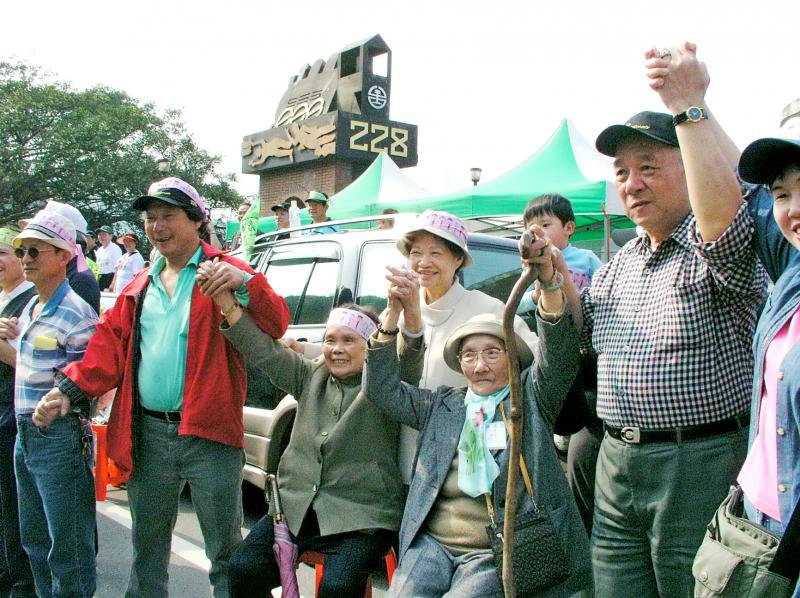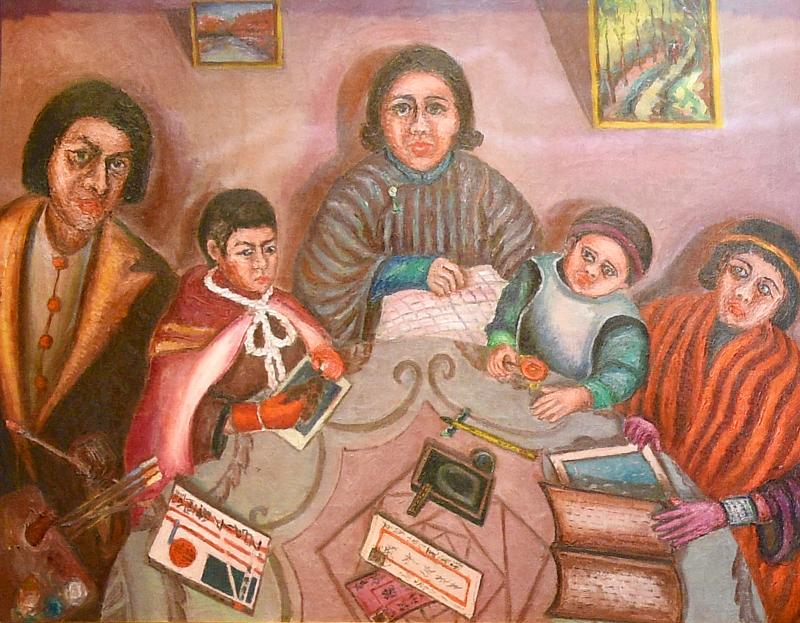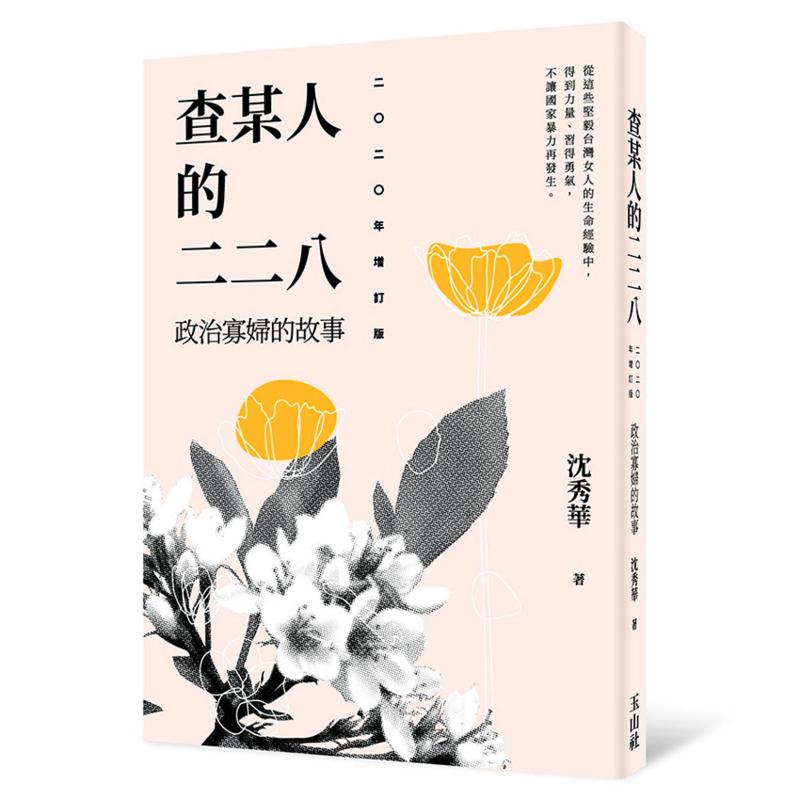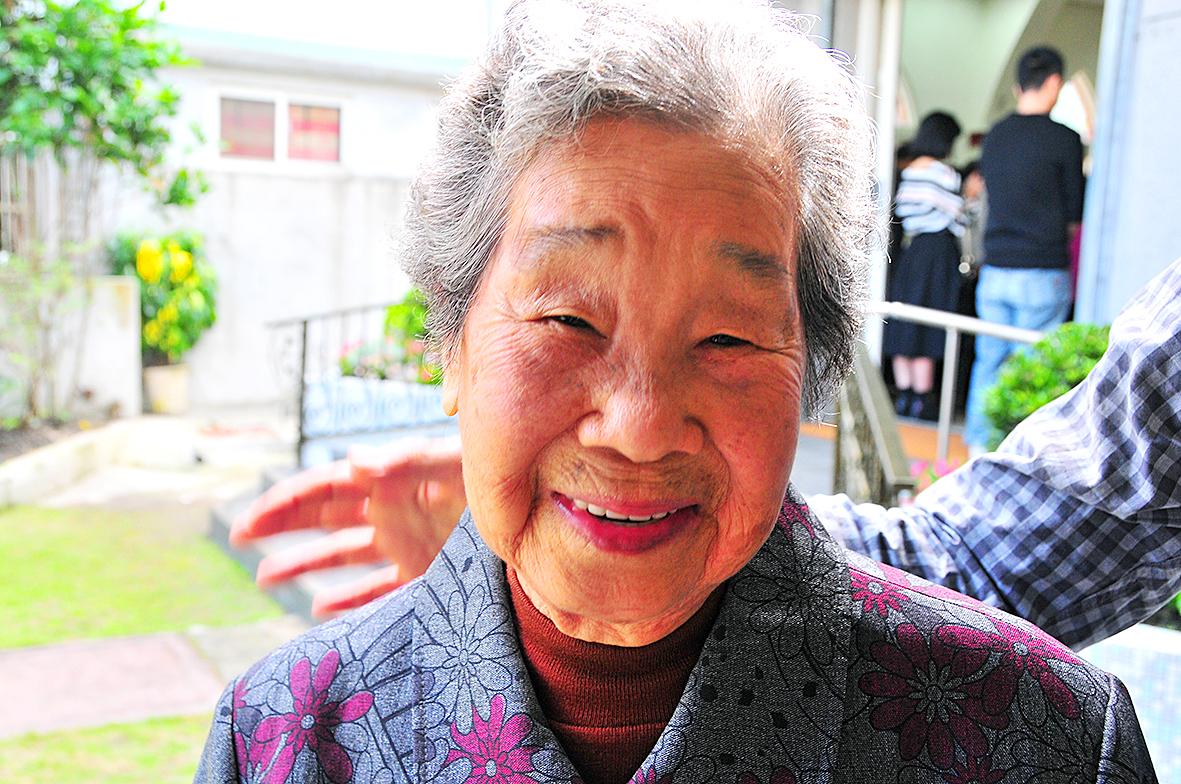March 8 to March 14
Forty-five years after her husband was executed in front of the Chiayi Railway Station, 93-year-old Chang Chieh (張捷) was still terrified to discuss what happened. She wasn’t the only one; for decades few dared to speak of the 228 Incident of 1947, an anti-government uprising that was violently suppressed.
As wife of the famous painter Chen Cheng-po (陳澄波), Chang is one of the better known widows of the 228 Incident, and not just because of her husband’s name. She calmly retrieved Chen’s body, had someone snap a photo of the corpse and secretly preserved the image along his shirt with the bullet hole. She also hid Chen’s works in the attic for decades while raising their children on her own.

Photo: Tang Sheng-yang, Taipei Times
Researcher Shen Hsiu-hua (沈秀華) met Chang in the summer of 1992, five years after the lifting of martial law. Shen was one of many traveling the country trying to piece together the truth behind the long-censored incident. Monitored and harassed by government agents for years, Chang repeatedly asked Shen, “Would I get in trouble if the police found out about your visit?”
When examining the casualties of the 228 Incident, it’s easy to forget those who were left behind. Countless more women suffered similar fates; 12 of their stories are recorded in Shen’s 1997 book, Women’s 228: The Stories of Political Widows (查某人的二 二 八: 政治寡婦的故事).
Some were quite eager to talk after bottling it up for so long: Chang Yang-chun (張楊純) says, “I never talked about it, I never cried about it. Whenever I thought of what happened to my husband, I’d just distract myself. I still had children to raise … But I knew that if a day came when I could talk about it, I would definitely do so … All I want is justice. There’s no use being angry, but I just can’t forget.”

Photo: Lo Pei-der, Taipei Times
In the preface to last year’s revised edition, Shen notes that the widows have since passed away. Several of them never found their loved one’s remains.
TRAGEDY STRIKES
Shen first noticed the lack of female voices regarding the 228 Incident around 1991 while collecting and editing oral histories in Yilan County. She wrote in the preface of the resulting book, Kavalan 228 (噶瑪蘭二 二 八), “The victims were nearly all men; how did their young widows cope and raise their children alone in a patriarchal society? How did they comfort their terrified, lonely souls?”

Photo courtesy of Taiwan Interminds Publishing
Shen writes that these widows are often seen as just an auxiliary part of the victims’ narratives, but through the interviews she found that they should be considered proper victims as well.
“They suffered great emotional and financial distress due to what happened, and were often directly monitored by Chinese Nationalist Party (KMT) agents during the seemingly endless years of martial law,” Shen writes. “They are direct victims of state violence.”
Kuo Yi-chin (郭一琴) was pregnant with her fourth child when her husband Yeh Chiu-mu (葉秋木), deputy speaker of the Pingtung City Council, was taken away. She opened her door three days later to see Yeh being paraded through the street on the way to the execution grounds. She fainted on the spot.

Photo: Hua Meng-chin, Taipei Times
Hsu Chiang-chun’s (許江春) husband Hsu Chao-tsung (許朝宗) disappeared during the Badu Train Station incident (detailed in the Feb. 23, 2020 edition of “Taiwan in Time”). She went to Keelung harbor, where troops dumped many of the bodies, and watched them bob up and down; none of them were her husband. She was about to jump in and end her life.
“I suddenly remembered that I still had two children, one was six and one was eight … I could not die!”
Chang Yu-chan (張玉蟬) had been married for four months to Chang Kuo-jen (張果仁) who, along with his brother and father, were shot at a cemetery in Hualien. She found the bodies the next evening, but only dared retrieve them the morning after that. When cleaning the corpses, Chang, who is Christian, saw her husband’s exposed intestines.
“If there is a God, why would he bring me such great disaster?” she cried.
STAYING AFLOAT
The deaths only marked the beginning of the hardships, as most of the interviewed were housewives. Even if they did work, it was helping out the family business or odd jobs for supplemental income. Not only did they exhaust much resources looking for and trying to save their loved ones, many victims and their families had their property confiscated.
In those patriarchal days, widowed women had little social status, especially widows of political victims. Even members of their own family avoided them.
Kuo was fortunate because she had many wealthy brothers; her younger brother gave her and her children a wooden sandal factory to run. It still was difficult to raise four kids while working full time, but she persevered.
She told Shen that she had only recently learned of the term “single mother” from a newspaper article.
“I was only thinking about how to support my children so they could grow up just like anyone else. I had no idea it was this difficult to be a single mother.” she says.
Su Pai-mien (蘇白勉), who also lost her husband in the Badu Station incident, and her six children were evicted from the railway workers dorm. Luckily a nearby family let them live in a small house on their property. Su found work at the coal mines, while her eldest two sons sold snacks at train stations. Sadly, she had to give away three of her children.
Due to continued government monitoring and social stigma, many of the widows refused to talk about the incident — even to their children.
“Telling them about it won’t bring him back,” Kuo says. “But I always told them to mind their own business and stay out of politics. It’s dangerous. So dangerous!”
AS WOMEN
When Shen asked the interviewees how they felt as women, many lamented their fate, but also added that they felt that they had become strong through their experiences.
“I feel that I’ve bravely gotten through this life,” Chang Yu-chan says. “Everything a man did, I had to do.”
An anonymous widow told Shen that after a few failed part-time gigs, she ended up as a sex worker, and later remarried to an abusive husband. But she feels at peace now.
“I tell people, my life has been like treading on waves,” she says. “The waves have highs and lows, and they change at any minute. It is very difficult to tread on waves, so I believe that I am stronger than the average woman.”
Taiwan in Time, a column about Taiwan’s history that is published every Sunday, spotlights important or interesting events around the nation that either have anniversaries this week or are tied to current events.

Late last month Philippines Foreign Affairs Secretary Theresa Lazaro told the Philippine Senate that the nation has sufficient funds to evacuate the nearly 170,000 Filipino residents in Taiwan, 84 percent of whom are migrant workers, in the event of war. Agencies have been exploring evacuation scenarios since early this year, she said. She also observed that since the Philippines has only limited ships, the government is consulting security agencies for alternatives. Filipinos are a distant third in overall migrant worker population. Indonesia has over 248,000 workers, followed by roughly 240,000 Vietnamese. It should be noted that there are another 170,000

Hannah Liao (廖宸萱) recalls the harassment she experienced on dating apps, an experience that left her frightened and disgusted. “I’ve tried some voice-based dating apps,” the 30-year-old says. “Right away, some guys would say things like, ‘Wanna talk dirty?’ or ‘Wanna suck my d**k?’” she says. Liao’s story is not unique. Ministry of Health and Welfare statistics show a more than 50 percent rise in sexual assault cases related to online encounters over the past five years. In 2023 alone, women comprised 7,698 of the 9,413 reported victims. Faced with a dating landscape that can feel more predatory than promising, many in

“This is one of those rare bits of TikTok fitness advice with a lot of truth behind it,” says Bethan Crouse, performance nutritionist at Loughborough University. “Sometimes it’s taken a bit too literally, though! You see people chugging protein drinks as they’re scanning out of their gym.” Crouse recommends the athletes she works with consume 20-30g of protein within 30-60 minutes of finishing a resistance training session. “The act of exercising our muscles increases the breakdown of muscle proteins,” she says. “In order to restore, or hopefully improve them — and get gains such as increased muscle mass or strength —

“Far from being a rock or island … it turns out that the best metaphor to describe the human body is ‘sponge.’ We’re permeable,” write Rick Smith and Bruce Lourie in their book Slow Death By Rubber Duck: The Secret Danger of Everyday Things. While the permeability of our cells is key to being alive, it also means we absorb more potentially harmful substances than we realize. Studies have found a number of chemical residues in human breast milk, urine and water systems. Many of them are endocrine disruptors, which can interfere with the body’s natural hormones. “They can mimic, block